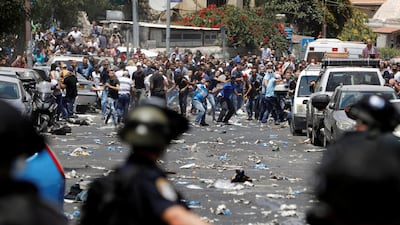At least three Palestinians were shot dead during clashes with Israeli forces in and near Jerusalem on Friday as protests over Israeli controls on access to the Al Aqsa compound turned violent.
The Palestinian health ministry said one of the victims was "killed after he was shot in the heart by live bullets" in Abu Dis in the occupied West Bank.
Two other Palestinians were shot dead earlier in east Jerusalem, one of them in the A-Tur area, the ministry said, without providing further details.
The clashes with Israeli forces broke out after the Israeli government decided not to remove metal detectors installed by police at the gates to Al Aqsa following an attack nearby that killed two policemen a week ago.
In anticipation of protests on Friday, Israeli police barred men under 50 from entering the Old City for prayers and deployed about 3,000 officers in the area.
A Palestinian advocacy group said police had also detained 10 prominent Palestinian activists in Jerusalem on Friday morning, including the leader of Palestinian president Mahmoud Abbas's Fatah movement in the city.
Police said later in the day that discretion could be applied in the use of the metal detectors instead of forcing everyone to go through them. However, Palestinian and religious leaders called on worshippers not to enter the compound until they were removed.
Hundreds held midday prayers near the gates of the Old City in protest.
Crowds gathered outside the Old City found shops closed and streets around Damascus Gate - the entrance most heavily used by Palestinians - blocked.
A group of several hundred people, including Muslim leaders, marched towards the Lions Gate entrance to the mosque compound, but police told them that only men aged 50 or over would be allowed in.
Police later fired stun grenades and tear gas towards protesters outside the Old City, while Palestinians threw stones and other objects at security forces in some areas.
"They turned back everyone who came here to pray but then I told them I was going to the doctor, but they did not let me in," said Ulfat Hamad, 42, who was visiting from the United States.
"I am going to pray here with others," he said outside the walls.
Tensions have risen since police installed the metal detectors in a move Palestinians and other Muslims perceive as a means for Israel to assert further control over the compound containing the revered Al Aqsa Mosque and Dome of the Rock.
The controversy has resonated beyond Israel and the Palestinian territories, with the United States and the UN Middle East envoy expressing concern.
President Abbas spoke with US counterpart Donald Trump's senior adviser and son-in-law, Jared Kushner, and urged the US administration to intervene immediately, warning that the situation was "extremely dangerous and might spiral out of control", the Palestinians' official Wafa news agency reported.
The security measures have also sparked anger in Jordan, which is the official custodian of the Muslim holy sites in Jerusalem. Thousands of people took to the streets of the capital Amman in protest on Friday.
The Jordanian foreign minister Ayman Safadi called Sheikh Abdullah bin Zayed, the UAE Minister of Foreign Affairs and International Cooperation, on Thursday to discuss the issue and both leaders stressed the importance of a complete re-opening of Al Aqsa to worshippers, the Wam news agency reported.
Turkish president Recep Tayyip Erdogan too has called on Israel to remove the detectors. He spoke by telephone with both Mr Abbas and Israeli president Reuven Rivlin on Thursday.
Israeli prime minister Benjamin Netanyahu stressed that the metal detectors were intended to ensure the safety of worshippers and visitors and not an attempt to disturb the fragile status quo under which Jordan is custodian of the site and Jewish prayer is forbidden.
Palestinians have been refusing to enter the compound all week in protest at the metal detectors.
The main weekly prayers on Fridays draw the largest number of worshippers - typically thousands - and speculation had been mounting that Mr Netanyahu might order the metal detectors removed.
But after consultations with security chiefs and members of his security cabinet, Mr Netanyahu decided not to order them removed.
Police said they had boosted their forces in and around the Old City, with units "mobilised in all areas and neighbourhoods".
The metal detectors were put in place following a gun and knife attack near the compound that killed two Israeli policemen on July 14.
Three Arab Israeli assailants fled to the compound after the attack, where they were shot dead by security forces.

